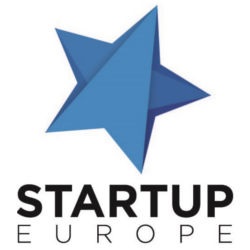 newsitems
newsitems  EUParliament Secretary General Welle to EuroFora on Strong May Election Winner +MEPs-Citizens e-Link
EUParliament Secretary General Welle to EuroFora on Strong May Election Winner +MEPs-Citizens e-Link
EUParliament Secretary General Welle to EuroFora on Strong May Election Winner +MEPs-Citizens e-Link
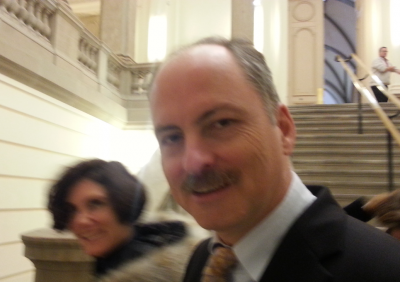
*Strasbourg/Angelo Marcopolo/- Strong Political Personalities, aiming at a clear Win in the forthcoming May 2014 EU Elections due, for the 1st time in History, to directly choose the new EU Commission's President and his Policies for the 2014-2019 period, added to innovative uses of Internet for MEPs - EU Citizens links throughout EU's Decision-Making process, (as "EuroFora"s project), could help find the right Solutions to recently growing Needs for better Democratic Legitimacy of EU's extending role in Economic and Political issues, which is of Vital Importance for the development of a Europe-wide Democracy, as it results from Statements of the experienced EU Parliament's Secretary General, Klaus Welle from Germany, in reply to "EuroFora"s Questions, as well as other relevant material, in the "European Rendez-vous" Conference co-organized by the prestigious French ENA School for Top Senior Officials, in cooperation with the European Public Administration pole (PEAP) during EU Parliament's Plenary Session here.
Topically, Welle intervened as the Key-note Speaker in the Concluding Session of ENA's European Conference, together with 3 University Professors, including a long-time Legal Director at EU Council in Brussels, after former WTO chief, Pascal Lamy, had kicked off the Starting session with another speech last Monday, both closely interwoving current Economy and Politics issues, only a Month before the biggest EU Parliament's political Group, that of ChristianDemocrats/EPP, chooses the Leader of its crucial 2014 EU Electoral Campaign, after almost all other Groups have just done so by choosing their own Leaders for the race to EU's Top Jobs, (See Infra).
--------------------
- Given the fact that, according to EU Lisbon Treaty, EU Council needs "a Qualified Majority" in order to chose whom it will propose as new EU Commission's President after "taking into account" the results of the latest EU Election, "EuroFora" asked EU Parliament's Secretary General Klaus Welle if he really thought that, a Candidate who succeeds to Win the forthcoming, May 2014 EU Parliament Elections with a strong Majority, wouldn't be blocked by a Minority of eventually Opposed Heads of State/Government inside EU Council, (who might attempt f.ex. to hinder a "Qualified Majority" in his favour, by a thin margin) ?
Something which seems likely, given the current Political situation throughout Europe (where EPP-ruled Member States are the most numerous), f.ex. if a "Socialist" Minority inside EU Council tried to block a possible Center-Right Majority which might emerge from EU Parliament's 2014 Elections. Be able to mark a Big Win is vital for EU Parties and even for EU Citizens to have a Say, because, Otherwise, i.e. in case of No clear Winner, EU Council's Heads of State/Government could, at least in Theory, play games with the various candidates...
- "I think that if someone wins a clear Majority in EU Parliament's Elections, then, he can certainly become the new EU Commission's President", clearly replied Klaus Welle to the above mentioned "EuroFora"s Question, after a moment of thought.
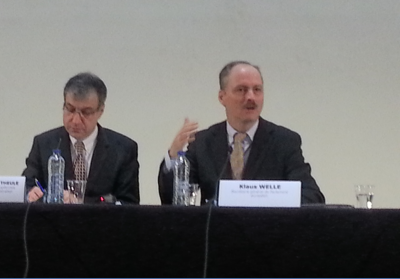
This is important, because, otherwise, at present "we (EU) are in a Fluid situation", as explained earlier Welle, since, despite EU Lisbon Treaty's Article 17, which states that EU Council must propose the new EU Commission's President by "taking into account" the results of the Elections for the new EU Parliament, which has the power to accept or refuse to elect Council's candidate, and even if EU Member States accepted a relevant agreement with EU Parliament on how to consult each other on this matter, nevertheless, legally all this seems, at first sight, to leave various Interpetations possible, and, since 2014 EU Elections will be the 1st time that it happens in EU's History, "we don't yet know if and how EU Council will really respect that" in practice.. "I proposed that recently, but the majority initially thought that it was "absurd", because EU's Member States were going to refuse it. However, the States didn't reject it", but we have still to see how it will work in fact, he added. Certainly, we (EU) are, at present, in a process, where we cannot prejudge its final results", he observed Today.
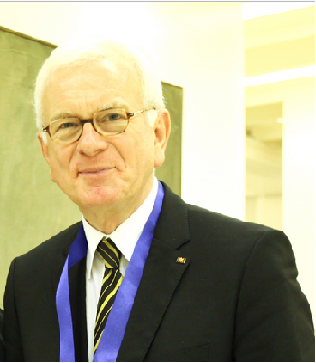
=> - "In that case, if it's really as you said, then, apparently the best possible EPP Candidate of (the biggest Political Group in EU Parliament) ChristianDemocrats/EPP, (which is the only one to still keep its choice open to various Candidates) for the May 2014 EU Election would be a strong Political Personality", well known thoughout the EU, and with strong and stimulating views about EU's role and Future, able to stir "hot" Political Debate, "such as f.ex. (former EPP Group and EU Parliament's President, currently Head of the Adenauer Foundation in Germany), Hans Gert Poettering, or, even more, (his friend the former French President , who served also as EU, G-8 and G-20 rotating Chairman in 2008 and 2011 respectively), Nicolas Sarkozy !", (who had both succeeded to attract former Far Right supporters towards mainstream EU Politics, while also Uniting together most Center and Right supporters, f.ex. in the 2009 EU Elections, as well as in the crucial 2007 French Presidential Elections, etc), "EuroFora" suggested.
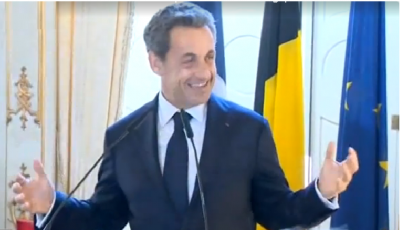
Indeed, strong and crystal-clear positions on EU's Cultural, Historic and Geopolitical Identity, on the priority to Political choices by Democratically elected politicians instead of Bureaucrats, with public Debates before crucial Decisions, on Human Rights, Democracy and Rule of Law Values, a big Ambition for Europe's Economic, Scientific and Technological Development, able to guarantee a Basic Social Welfare, Moral Values and elementary Rights for its People, and on Europe's role in a Multi-Polar, and, therefore, more Democratic World, at an era of galoping Globalisation, (etc. : something that f.ex. their famous, crystal-clear opposal to Turkey's controversial and unpopular EU bid resumed well enough), were among the key ingredients of their +2007-2009 winning recipes, including at the latest EU Parliament's Election where their respective ChristianDemocrat/EPP Parties won an exceptionaly large Victory both in France and Germany, (that the 2012 electoral campaign in France proved anew as Right, ...a contrario : I.e. by rejecting an initial Watering-down imposed by some party Apparatchics far away from People's concerns, that Sarkozy personaly tried to Rectify at the end, with good but insufficient results, when it was too late, while his Competitor, Hollande, had done anything he could to, precisely Avoid any Debate on too "Hot" issues such as Turkey, etc : Comp. f.ex. his relevant Statement, first to "EuroFora", at the eve of the 2012 Election : http://www.eurofora.net/newsflashes/news/hollandeoneuturkey.html )...
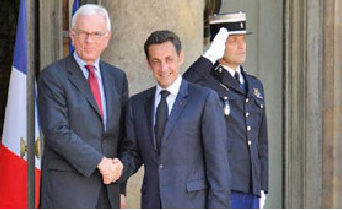
=> Significantly, Klaus Welle did not deny such a possibility, as suggested by "EuroFora", but appeared to rather give at it a deep Thought, in order to examine it carefully, before pronouncing himself openly, in one way or another, ... Particularly when EPP's President, Joseph Daul, French MEP from Strasbourg, has officially confirmed, and recently reiterated, the collective Decision taken by the latest EPP Heads of State/Government Summit, last December in Brussels (Comp. "EuroFora"s newsreports from the spot), in the presence also of influential German Chancellor Angie Merkel, to keep open the procedure for the nomination of its official Candidate to the post of nezw EU Commission's President much longer than all the other Political Groups : I.e. up to the 5th of March, 2014, at the eve of the forthcoming EPP Summit in Dublin, Ireland, where Heads of State/Government and other Top delegates are due to finaly choose the Political Leader to whom they will entrust the duty to give the 1st ever EU-wide Political Fight in order to win the May 2014 EU Parliament's Electoral campaign throughout all 28 Member Countries...
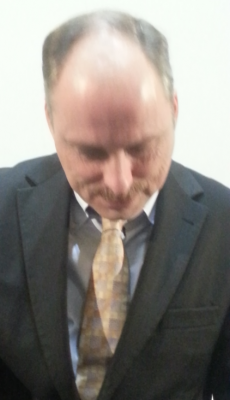
Certainly, 4 more Names have already circulated in the Press as possible EPP Top Candidates, spreading from Finland's Prime Minister Jyrki Katainen, former Latvian Prime Minister Valdis Dombrovskis, and current EU Commissioner for the internal market, former Minister, Michel Barnier (France), up to and Prime minister of Luxembourg and €uroGroup President Jean-Claude Juncker. IMF's Chief Christine Lagarde has also been cited at certain moments, after EU Commission's vice-President Viviane Reding, etc.
It's certain that most among those Personalities possess precious Qualities, which could be effectively used at one or another among the soon available EU leading positions, in one way or another, (f.ex., in addition to EU Commission's President, there is also : EU Council's President, €uroZone's Chair, High Representative on External Relations, EU Parliament's new President, new EU Commission's vice-Presidents, etc), as German Chancellor Angie Merkel has recently observed in Brussels.
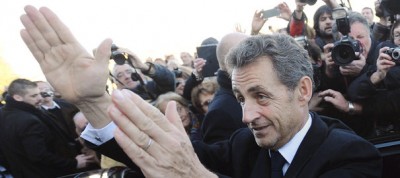
But it's absolutely another, Differend matter, to face various Popular aspirations, fierce Political Competition, "Hot" Ideological Fights, etc., in a succesful way in real practice, including at grassroots level, with the Hard task to attract Rightists at mainstream EU politics, while also keeping more traditional EU Voters united around a certain EU policy, (Comp. Supra).
Meanwhile, Liberals decided for a "ticket" led by former Prime Minister and current Chairman of the Liberal Group of MEPs Guy Verhofstadt (Belgium) followed by EU Commission's vice-President for Financial and Monetary affairs Olli Rehn (Finland), the "Greens" voted for MEPs José Bové (France) and Ska Keller (Germany), "EuroLeft" has notoriously chosen Alexis Tsipras (President of SYRIZA party in Greece). While Conservatives/Reformists have said that they won't present any EU leader for the job of Future EU Commission's President, and things are still quite foggy about an eventual future Group of Rightists and their intentions in this regard.
-----------------------------------
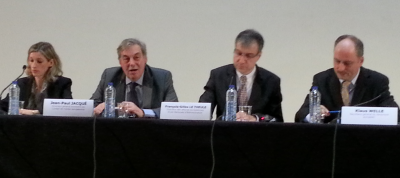
+ Jean-Paul Jacqué, new President of the European Public Administration pole of the Upper Rhine, experienced long-time f. Director for Legal affairs at EU Council in Brussels, and former Dean of Strasbourg's Law Faculty, ééwarned that, from a point of view of Democratic Legitimacy, the real Power is not yet at the EU Commission, while most People naturally trust much more the (directly elected) Heads of State/Government who are gathered inside the EU Council, instead of a body that they could not control until now.
- The idea to elect, for the 1st Time, the new EU Commission's President according to the results of EU Parliament's forthcoming, May 2014 Elections, following the entry into force of the Lisbon Treaty after 2010, is "interesting", he admitted.
- "But, there is a Risk" : If it doesn't work, then, it's the end of the whole system, he warned. In particular, , there is a big Problem : It's not enough for the People to pronounce themselves vis a vis some Personalities that they don't even know well, he pointed out.
=> "Behind that, it has to be also a "Content" to choose. Thus, it could really be "Differend this time", if People had to pronounce themselves vis a vis "Solutions". ... i.e. "on Concrete Issues", President Jacqué stressed. From this point of view, the Risk is, under pressure from Anti-European populists, to focus only on a dillema of the kind : "Yes or No to Europe". Whie, on the contrary, what People need most of all is to debate on Questions concerning the various ways that Europe can help face the most crucial Issues which will shape their Future, having important consequences, he concluded.
+ However, EU's system is made in such a way that "every Decision is the result of a Compromise" between EU Council's Member States and EU Parliament, and EU Citizens often don't see clearly how it works in practice, or don't understand its results, Jacqué added afterwards.
- But this is typical also of all Federal States, as f.ex. Germany, where Chancellor Merkel was obliged to tell to her friend, f. French President Sarkozy, that, even if "I agree wth you, and I love you, I can't decide alone, because I'm obliged to see also what the Bundestag" (and/or the National Constitutional Court) "will say about that", he observed.
--------------------------
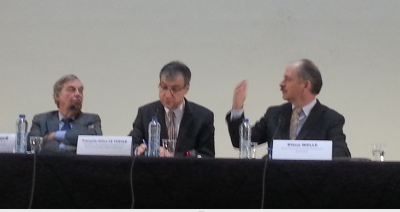
+ Nevertheless, Today, "EU currently needs more Legitimacy", mainly because it has to deal with more serious issues, with bigger stakes than in the Past, which affect more directly and seriously People's lives, acknowleded EU Parliament's Secretary General, Klaus Welle.
- However, at least for a certain period of time, very probably, this will have to be done, in practice, even without Changing the EU Treaty, since Institutional modifications are not something which could be done just in a few Days, Months or in the forthcoming few Years, he observed. => That's why we have to look at all the possibilities which exist in the framework of the present (EU) Treaties, to change something which could help us advance forward, by strengthening EU's Legitimity, he advised. "I.e. without a Revision of basic Constitutional Treaties, but by the way in which they are applied in real practice, (f.ex. what the nearby Carlsruhe's German Constitutional Court, calls "Verfassungs' Wirklichkeit"). F.ex. in the American Constitution, most changes are made with "Amendments", but they are rare. However, the US Constitution has had a capacity to adapt itself, through Centuries, to various circonstances, f.ex. since the 18th Century, up to the Modern Times, to the needs of a Global Power, before and after the Cold War period, etc.
+ In this regard, Klaus Welle didn't refuse, but heared thoughtfully, "EuroFora"s suggestion that, in line of his efforts to enhance EU Parliament's links to EU Citizens' concerns, it would be interesting to explore also the various possible ways of opening up to quasi-regular Public Debates between and with EU Citizens interested by EU Parliament's most important Decisions which affect their live and/or Society at large, before such Final Decisions are to be voted by the Plenary, according to the main lines of our 1997 (Comp. initial collective project "Europe in the World", officially retained by EU Commission in order to be examined in the framework of "ESPRIT" Program on Innovative uses of Modern Information and Communication Technologies), and 2006 (See "EuroFora"s intervention in EU Parliament's Press Conference by former EU Commissioner for Communication, Swedish Socialist Margaret Wallstrom), as well as 2007 (Comp. launch of "EuroFora"s project, and various relevant Publications since then, etc).
Particularly when, recently, as "EuroFora" also pointed out to EU Parliament's Secretary General, even Russia has already started to experiment an Internet-based system of Debates and Questions/Replies with interested Citizens during new Bills' Decision-making proces at the Duma, (according to an official presentation, supported by relevant Documents, made by the Russian Delegation to CoE's PanEuropean Parliamentary Assembly on January 2014 in Strasbourg), while also China has started to practice both "Voting" Democracy and "Deliberative" Democracy during recent years, the latter meaning interested People's "Consultations" and Dialogues with the competent Authorities before important Deciosions due to affect their lives...
+ Meanwhile, in Europe, CoE's Assembly has just voted and adopted a Report drafted by its new President, Anne Brasseur from Luxembourg (former Chairwoman of the Liberal Group of MEPs) on "Internet and Democracy", which advises to examine ways for engaging in Dialogue with concerned Citizens before important Decisions are taken by Parliaments, and finally contains even an Amendment unanimously added by PACE's Political Committee, launching a Call for a New Protocol to the PanEurooean Convention on Human Rights in order to establish a New Right for interested Citizens' Participation in the Decision-making Process of Public Authorities whenever it seriously affects their lives, (Comp. relevant "EuroFora"s NewsReport and President Brasseur's positive reaction at : http://www.eurofora.net/newsflashes/news/pacepresidentbrasseuroninternetanddemocracy.html ).
Such developments could even find several useful Legal Basis in a series of coherent Case Laws, Texts and Practices which have been growing, slowyly but steadily, during the last 3 Decades in many key EU Member States' Legal order, on which "EuroFora"s co-Founder has already made and published a 1st detailed and concrete Analysis in a University Research work of more than one Thousand pages, since the 1980ies, (which was selected by Strasbourg's Faculty of Law in order to be presented for a Prize destinated to PhD. Doctoral Thesis, on a written proposal by Professor Paul Amselek), followed also by subsequent 2010 work to Update and Enlarge the scope of Research also on several other European Countries, as well as on EU's and ECHR's inputs, (etc), focusing on the concept of "Decision-Making Process" ("Processus Decisionel", according to the Original term in French) of Decisions submitted to Public Law, where affected Citizens are informed beforehand and invited to present their observations, to which they should receive a sufficient and correct Reply by the Public Authority invested with the Legal Competence and Responsibility to take the Final Decision, but without ignoring Citizens' concerns nor revealing any eventual abuse of power.
In addition, relevant EU and ECHR legal developments advancing in a similar direction at a European and PanEuropean level were highlighted for the 1st time at an interesting 2 Days-long Conference organized by Strasbourg's "European Public Administration Pole" for the Upper Rhine region (PEAP), currently chaired by Professor Jacqué, EU Council's honorary Legal Director, with the participation of key University Professors, ENA and other National Top Officials and Experts, (including the Chair of France's public "Debate Commission", a bodu initally set up by EU Commissioner Michel Barnier, when he was serving as Environment/Public works Minister, etc), to which "EuroFora"s co-founder particiated actively, on 2010.
+ Last but not least, CoE's 2013 Annual "World Forum for Democracy", organized last November in Strasbourg, focused for the 1st time on a critical presentation and assessment of various Internet-based Tools and concrete Projects on Citizens' participation to Democratic Decision-making procedures, mainly as a new way to ReVitalize Representative Democracy, confirming (despite a few unavoidable lacunas, at the beginning) the fact that "EuroFora" co-Founder's initial 1997-2007 (See +"EIW" collective Project) insight in favour of Internet-based Public Debates between EU Citizens and EU Politicians before important EU Decisions which affect their lives, was and is even more Today, pertinent, as well as able to stimulate, choose and develop in the foreseable Future some among the best possible ICT tools, (Comp. f.ex. also : "EuroFora"s NewsReports from that WFD, also f.ex. at : http://www.eurofora.net/newsflashes/news/eupiratepartyseipenbuschworlddemocracyforum.html , etc.).
------------------------------
=> Questioned Today about the Democratic Legitimacy, and Accountability of MEPs, particularly vis a vis EU Citizens who Voted for them, regarding whom they are often seen as too Distant, sometimes even dangerously cut off from any regular and serious exchanges, may be for years, Welle replied that EU Parliament was well "Aware" of this topical issue...
- Recent Studies show "both MEPs and (US) House of Representatives' members .. need to remain in contact with on average of about 700,000 Citizens", each. Something which is "absolutely Differend from National Parliaments, where, there are, in average, "only 100,000 citizens for MPs in even the biggest member States", Welle noted.
=> In consequence, for this and other reasons, "Legitimate Questions are raised" on how MEPs could come Closer to EU Citizens, EU Parliament's Secretary General aknowledged.
In the USA, most Representatives keep a very concrete and quasi-constant presence in their Constituencies, f.ex. with the help of some 20 or 30 Assistants on the spot, he observed in comparison.- However, "I don't think that it might be necessary for us (EU) to do alike, by proposing equal Expenses" as USA traditionaly does.
- "But, nevertheless, we (EU Parliament) are currently Thinking whether we should, f.ex., use Modern Information/Communication Technologies in order to better link our MEPs with their Constituencies and with EU Citizens", he revealed, (obviously pointing at a Direction similar to "EuroFora"s project). so that EU Parliament needs to reflect on "how to support MEPs better ...through greater Logistical support" (f.ex. in the organisation of ICT tools) in this regard, as he suggested in a 2013 Report (See Infra)..
+ In addition, "we are also in the process of establishing a more "Filtering" System, f.ex. by signing Today an Agreement of Cooperation with EU's Economic and Social Chamber, as well as with EU's Committee of Regions, which have, each, their own Networks better linked, respectively, to Trade Unions and Business Associations, or Regional areas, that we (EU Parliament) could try to use during our Law-Making Process", he said now.
=> "So, in general, we (EU) are Conscious of this problem, and of the Need to Establish a Continent-wide Democracy, which has to be organized in a Differend way than a purely National Democracy", Klaus Welle stressed in conclusion of Tonight's ENA/EU Parliament Conference in Strasbourg, on this point of crucial importance Today, as recent Events and current Polls obviously show.
- However, classical Constituency links cannot always be really helpful in EU's case, because, as Professor Jacqué critically observed, contrary to what is the case in the USA, where House Representatives are chosen at a Majority (Electoral) System, in a way that, each one of them, has more clear links with a well Defined Constituency area of his own, the siuation is often Differend in several EU Countries : F.ex. en France, where MEPs are Elected on a Proportional System of Party Lists, inside some very Large Areas : In consequence, You (as EU Citizen) are sure to see them only during Election time, (i.e. once in 5 Years !), but, afterwards, you can't but scarcely see them for many Years", until the next EU Elections, he denounced, (while also observing that things are, nevertheless, "Differend in some other EU Member States, as, f.ex. in Belgium", where MEPs are often present throughout their respective constituencies, as he noted).
+ As for EU's Regions and/or Economic/Social Chamber, etc (cited Supra), it's even more obvious that, even if they could probably add some useful inputs in Specific issues, nevertheless, they are not made at all in order to vehiculate EU Citizens' reactions to "Hot" Political Issues, which are the most debated by the People at large.
=> Therefore, the above mentioned MEPs - Citizens Problem remains largely Open, not having any other known way to be solved, but mainly by searching some Innovative Solutions that Modern Information/Communication Technologies, and particularly the Internet, more and more widely interconnected, easily and frequently used in Desk and Mobile PCs, Tablets and SmartPhones, etc., as "EuroFora"'s project co-founder had already suggested, in a collective project officially accepted by EU Commission in order to be examined in the framework of an EU Program for Innovative Social uses of ICTs, as early as since 1997 (Comp. Supra)...
----------------------
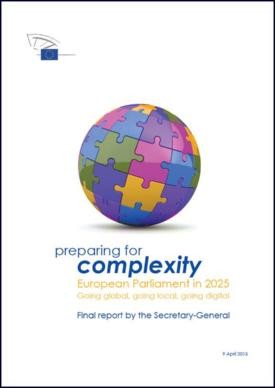
- In this regard, it's interesting to note that in his recent Report on "EU Parliament in 2025 : Preparing for Complexity", published less than a Year ago, on April 2013, Klaus Welle, speaking of what he called a "Multi-Player System", observed the fact that, Today, EU "Citizens do not only wish to be better informed. They wish to investigate by themselves", and, even more importanty : "They are eager to Express and Share their Views. They expect to be Consulted and to actually Participate in (EU) Decisions. They wish to see that their Voice and their Vote actually matters. This evolution puts the Traditional Representative system under stress", (which could be particularly Creative)... This is part of a new element which should "be taken into account when preparing for the Future", which is the fact that "New actors (are) entering the scene. We are faced with a change towards Multi-Actor Policy Making, where not only states are interacting", as whe wrote. Indeed, "NGOs, private companies, grass-root organisations, sometimes Individuals are introducing their Ideas and Positions ever more intensively", while also "Policy Networks" go more global, knowledge-based and volatile. They are turning from clubs to Hubs". - "This is why traditional institutional consultation mechanisms - as the one organised by the Commission - partly fail to capture their rich potential input". Therefore,."finding a Balanced way for the European Parliament to effectively and fairly handle policy input from a growing multitude of actors, without losing sight of its own goals, constitutes a Challenge for the Near Future", Welle concluded on this point.
=> Moreover, "demands from (EU) Citizens to gain a better grip on European decisions have been exacerbated by the (Global) Crisis. ... What has changed ... is that Citizens are now much more aware that what is being decided on the European level is touching the Heart of their own Social and Economic living conditions - directly and immediately... This is why the ... decisions taken between national Governments, EU Commission and the financial institutions in Brussels (and Frankfurt) are questioned and Debated by all kinds of citizens, medias, grass-root or "Net-root" movements .. They are questioning the Legitimacy. They wish to know what will be the likely impact of decisions taken. Who decides, on which basis, and under which type of democratic control? They don't only require transparency. They ask for content, background information, independent assessment. They turn to MEPs for analysis and intervention". They are likely to make full use of newly established (EU) "Citizens' initiative" to channel their concerns", (etc).
- What Klaus Welle optimistically named as a "New Democratic Tide in the field of European affairs" should have "consequences .. of a quasi-Constitutional nature" : It calls for an "Increased degree of Democratic 'legitimation' on European level", which "can only be achieved by the European Parliament, as democratically elected body, and by means of intensified Democratic Scrutiny on ..decisions", f.ex., among others, "MEPs and the Parliament as an institution, will be also affected significantly by the growing demand for content, Debates", etc, where "they can act as Ambassadors -even if Critical ones - of the European level".
+ Moreover, it's also a matter of "a sense of European Identity in law", that "the Treaties of the EU provide .... with a proper (EU) Citizenship, as well as fundamental Rights", particularly since 2010, while even a "recent decision of (EU) Parliament's Bureau to create a Directorate for Democracy Promotion sits firmly in that" trend.
------------------------
- In front of such "converging Expectations for a Democratic Revival", "it is ... certain that all Public Institutions will encounter a steady Pressure to derive the best from the New (Information/Communication) Technologies", as the Internet, etc., (according to EIW/"EuroFora"s 1997-2007+ presented Project : comp. Supra).
- Thus, "the growing emergence of the individual (EU) Citizen as a political actor in his or her own Right", is a "New phenomenon ..intimately linked to the Technological quantum Leap" : "The Internet revolution, .....and the emergence of new hardware tools like SmartPhones and Tablets" have democratised the Access to and Exchange of information", almost at the same time with the recent emergence, after EU Lisbon Treaty, of EU "Citizens' Initiatives", which could "introduce an element of Participatory Democracy"
+ Moreover, "at a certain stage, Parliament might wish to consider whether to introduce (EU) Citizens' Participation as a direct and Systematic element into the Legislative Process. The Technological basis for Consultation of (EU) Citizens on texts exists with Software like 'Liquid Feedback'", (etc), Welle concludes pertinently in his 2013 Report,
... curiously stopping just a step before clearly aknowledging also the Vital Need today also for EU Citizens' Public DEBATES and Dialogue, including with key MEPs, before important EU Parliament Decisions affecting their lives, according to "EuroFora"s/EIW's 1997-2007+ presented project (Comp. supra. + See also German "Pirate" Party Founder and former President Jens Seipenbusch's INTW with "EuroFora", precisely on the issue of "Liquid Democracy", that his party already uses in real practice, who suggested a quite simple and practical way to realise "EuroFora"s idea which includes both EU Citizens' Votes and Debates before in the run up to crucial EU Decisions : To simply add to the Software "Liquid Feedback", on which he's been working since a long time, another, "classic" Software for Internet "Forums", that it currently lacks : See http://www.eurofora.net/newsflashes/news/eupiratepartyseipenbuschworlddemocracyforum.html ).
-----------------------
+ Meanwhile, an own-initiative report by Paulo Rangel MEP on the implementation of the Lisbon Treaty with respect to the European Parliament is scheduled to be discussed and voted by the Constitutional Affairs Committee next week in Brussels, (11 February 2014).
-----------------------------------------------------------------------------------------------
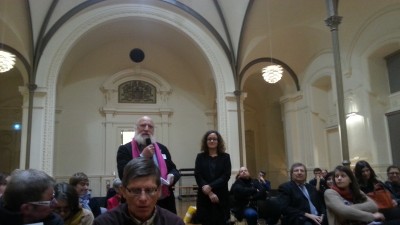
+ At any case, whenever any EU Treaty Change might be needed in the foreseable Future, on this or another issue, it's better not to aim at an entirely New EU Treaty "which changes everything", but rather to "Targetted EU Treaties"/Agreements, which would "solve 1 precise problem", Welle added in reply to another Question by Strasbourg's European House Director, Bohner, an experienced former long-time Top CoE Official.
--------------------
But, the reaction of EU Parliament's Secretary General to a "Fictional" Question, by PanEuropa's co-President for France, and current Head of the EU Federalists for Strasbourg's region, Count Christian d'Andlau-Hombourg, on how EU should proceed if a Majority of Voters in the May 2014 EU Election supported a call to establish a European Federation, was even more unexpected :
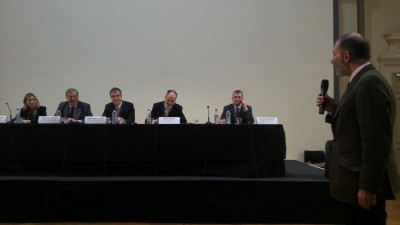
- My personal opinion is that the EU, without being yet a Federation from a purely Legal point of view, in fact, it already works in a way which is similar to a Federal entity, Welle claimed surprisingly...
- Because, currently, it's only Culture and Sport which are explicitly reserved to EU's Member States, while, on the contrary, Space, Agriculture and Fisheries are reserved for EU's competences, he observed.
=> Therefore, all the Other Issues are "potentialy European", "if the National States agree" on that, he pointed out.
- And, indeed, this corresponds, Today, to what is often considered as a "great Inter-Governemental trend" inside EU Council :
- That's only one way to see things. But there is also another point of view : That's exactly what happened during the last few Years, when EU Heads of State/Government authorized to deal and decide at an EU level even Political Issues for which this wasn't allowed in the Past, thereby allowing "a large Europeanization of Policies" for which such a thing was unthinkable until now :
F.ex. the Monitoring of National Budgets by EU Commission. The possibilty EU's Central Bank to Supervise all Banks in Europe, whenever it deems necessary. This is very Important, since Banks are the Nucleus of all National Economies, (etc).
=> Thus, we have already advanced along a road which leads to more and more Europeanisation, since the Member States, facing the hard Necessities of the recent Global Economic and Financial Crisis, have accepted to deal at a European level with issues which were traditionaly National : Something that Nobody would have believed if he had heard of that just 10 Years ago !,... concluded Welle on this point, concerning a trend which has started since the recent Sarkozy - Merkel era, particularly when the former French President and, then, EU Chairman, had succeeded to convince all €uroZone Member State's Chiefs to gather exceptionaly together, a Sunday of October 2008, at Elysee Palace in Paris, in order to discuss and Decide all together, a series of voluntaristic Measures to boost their Economy against risks of Recession provoked by the Global Crisis, which had just started then, as they did from next Mondey morning, in a spectacularly concerted manner, with unprecedented efficiency throughout Europe.. Various other similar advances were also made afterwards on several different occasions, up to the more recent Banking Union's preparation, etc.
-------------------------------------------
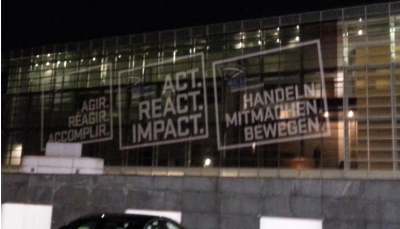
However, when asked about the "Vision" (view) of Europe that this or that EU policy choice might serve, from a Political point of view, EU Parliament's Top Officer appeared careful, pointing rather to the forthcoming Debates between 2014 EU Election's Political Leaders :
- "We (EU Officers) can explain you the way that the (EU) Mechanism works, but we are not Pilots (Drivers) of "Formula 1" cars... ", Welle joked in reply.
- Because those who are going to Drive the (EU's) Machine are the Top Candidates" of EU Parliament's Political Groups, "and we (EU Parliament's Officers) are just the Engineers who try to make that Machine as Performant as as possible for that purpose", as he put it.
- However, Klaus Welle expressed the view that, "at present, I find that we are too much in a Defensive position, mainly because of a current debate on so-called "Cost of the EU". But, I remember, some 15 or 20 Years Earlier, People had an absolutely Differend Approach, since, the main Debate then, was, on the contrary, that of "the Cost of Non-EU", as he reminded, obviously pointing at a period before Turkey's controversial and unpopular EU bid, i.e. before 1999, when the 1st ever Majority Abstention of Voters to EU Elections appeared suddenly (followed on 2005-2007 also by 3 "No" to EuroReferenda on an EU Constitutional project, etc),, right after the Helsinki EU Summit which had surprisingly accepted Turkey's EU claims on 1999, (while it had rejected earlier a similar attempt f.ex. by Morocco, on the contrary), inevitably giving to EU Citizens the impression that both their Democratic and Human Rights, as well as their Social Welfare and Cultural Identity, etc. were threatened to be Downgraded to the dangerously Low level to which they notoriously are in Turkey, as f.ex. ECHR's case law obviously attests with a persistent Record High number of Judgements Condemning Ankara's Authorities for particularly Serious Violations of Human Rights until now : f.ex. Killings, Torture/Inhuman-Degrading Treatments, Arbitrary Jailings, muzzling of Press Freedoms, Unfair Trials and/or Discriminations, etc).
- Well before that, we (EU) had been able to abudantly demonstrate, with several concrete examples, the fact that, already, in various sectors of activity, "we (EU Economy and Citizens in general) are loosing too much Money, precisely for Not having yet developed Sufficient European tools !", as he reminded. - "That was absolutely anOther, totally Differend Debate from those that we hear Recently... ", Welle underlined, obviously pointing at a periodicaly recurring EuroScepticism which has started to grow since 1999 (i.e. since Turkey's unpopular EU bid : Comp. Supra), including with 3 "No" to EU Constitution's EuroReferenda in France, the Netherlands and Ireland, between 2005-2007, resulting, particularly, in a Delay of €uroZone's Economic Governance, contrary to what had been initially Scheduled as early as since 1995, as f.ex. a landmark EU Parliament's debate in Strasbourg about EU's State of the Union, with the participation even of UNO's Secretary General (then, Boutros-Ghali), had clearly revealed, already at the moment when the €uro was prepared, on October 1995... So that Sarkozy-Merkel and other EU Heads of State/Government had to try to hastily find ways to meet the Urgent Need to forge some efficient Tools able to face the 2009-2012+ Global Crisis when it suddenly erupted, finding then Europe unprepared yet : A Delay in EU Construction which obviously provoked a lot of Damages to the detriment of Europe and its People, which could have been largely prevented, if European Edification had a chance to advance, earlier, as it had been initially scheduled, without any undue obstacle, in order to Timely complete the gaps obviously left when the €uro had started, with the declared, then, intention to fil them up the soonest possible, (Comp. Supra)...
- Thus, we have found f.ex. that, simply by not having yet developed enough a Europe of Digital Economy, Services, and/or Economic Coordination tools, etc., we are currently loosing many Billions € that a well-developed and adequately organized Europe could have given us a chance to gain, Klaus Welle observed, calling, Today, for a New Debate on that crucial point, with all main EU Parliament's Political Groups, which "could help create a New Consensus" on the need to develop Europe further and better on certain areas of key importance for the Future.
------------------------
+ Also because "it's important to note that, at least until Today, inside the EU there is Not any Absolute Political Majority standing alone, but only many and various, Smaller or Bigger Minorities' Groups" of MEPs, went on to add Welle, in reply of further questions in a Political direction.
=> In consequence, particularly inside EU Parliament, most of the times, almost everybody is obliged, in practice, to Hear what the Others have also to say, so that in our System one always has to Listen to the Others, simply because it has better results when we hold Debates able to broker Political Compromise Agreements on one or another concrete Policy Issues : Something which has what many consider as an Advantage, to foster a Culture of Consensus, since nobody has ever had an Absolute Majority until now", as he observed.
(.../..)
***
("DraftNews", as already sent to "EuroFora"s Subscribers/Donors earlier. A more accurate, full Final Version might be published asap).
***
Main Menu
Home Press Deontology/Ethics 2009 Innovation Year EU endorses EuroFora's idea Multi-Lingual FORUM Subscribers/Donors FAQs Advanced search EuroFora supports Seabird newsitems In Brief European Headquarters' MAPs CoE Journalists Protection PlatformBRIEF NEWS
- 00:00 - 02.06.2021
- 00:00 - 18.10.2020
- 00:00 - 19.06.2020
- 00:00 - 18.05.2020
- 00:00 - 20.04.2020
- 00:00 - 02.02.2020
- 00:00 - 09.12.2019
- 00:00 - 27.11.2019
- 00:00 - 16.11.2019
Popular
- Yes, we could have prevented Ferguson riots says World Democracy Forum's Young American NGO to ERFRA
- Spanish People Elect CenterRIGHT Majority with 1st Party and Total of 178 MPs (6 More than the Left)
- Pflimlin's vision
- The European Athletic "Dream Team", after Barcelona 2010 Sport Championship Results
- Source Conseil d'Europe à ERFRA: Debatre Liberté d'Opposants à Loi livrant Mariage+Enfants à Homos ?
- Head of BioEthics InterGroup, MEP Peter Liese : "Embryonic stem cell research reaching its END" !?
- Spain: Jailed Turkish Terror suspect with Explosive,Drones,Chechen accomplices stirs Merah+ Burgas ?
- UN Head Ban Ki Moon at CoE World Democracy Forum : - "Listen to the People !"
Latest News
- Test Photos (f.ex.+ Invit to EU + Korea Peace meeting)
- EUOmbudsmen Conference 2022: Digital Gaps affect People's Trust threaten EF Project on EU Future ?
- French Election : Black Out on Virus, but Obligation for Fake 'Vaccines" Challenged
- Both French Presidential Candidates point at "Humanism" in crucial times...
- France : Zemmour = Outsider may become Game Changer in Presidential + Parliamentary Elections 2022
Statistics
Visitors: 62169492Archive
Login Form
Other Menu
EuroCorps, aged 15, may graduate in 2009, boosted by Strasbourg's Human Rights/Reconciliation symbols and fresh political will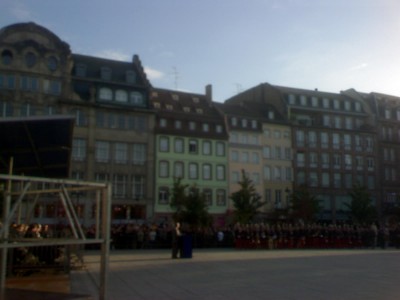
Popular : EuroCorps' chief, General Pittarch, and Strasbourg's Mayor Ries, speak to the People, downtown.
---
* EuroCorps, EU defence's etat major, which has just celebrated 15 years of age (1993 - 2008), is young enough to feel enthousiasm for missions to guarantee Human Rights, Peace and reconcilation : Strasbourg's Historic Symbols, but also maturing fast, (particularly under the current French EU Presidency), in order to prepare potentialy important developments in 2009 :
- "EUROCORPS" is a "unique tool" for "a Modern Europe", jointly managed by participating Nations without anyone deciding for others", to "support their efforts to promote Reconciliation, Peace and Human Rights' Values, which identify today's European ideal, with its Symbol-City : Strasbourg", stressed its Chief, Spanish General Pedro PITARCH, in a popular ceremony for the 15th Anniversary of the European Army Corps, at its Headquarters.
- "Today, we are ready and able to fullfil any Peace-keeping Mission may be decided by the Political leadership, since we can deploy up to 60.000 soldiers and/or other agents, mainly in land, but in coordination with Sea and Air operarions", (even to build vital Infrastructures, demining, keep public order, facilitate Elections, etc), said to EuroFora EUROCORPS' Spokesman and Press Director, Colonel Raul SUEVOS.
- "If there is an Agreement with the framework Nations, EUROCORPS could certainly contribute to guarantee manifold aspects of Peace setllements", told us recently General PITARCH.
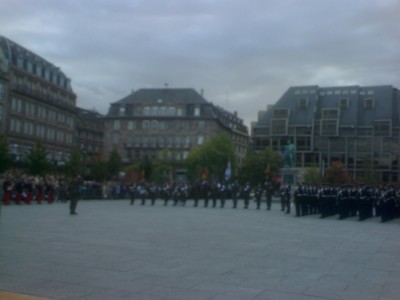
EuroCorps framework Nations' flags in Strasbourg's central square, on 2008, under the eyes of Napoleon's general KLEBER, famous for its Egypt campain, (reminded by German chancelor Merkel at Berlin's March 2007 EU Summit in a symbolic 1799 gift to the French President)..
---
EU Parliament asked, Summer 2008 in Strasbourg, " to place Eurocorps as a standing force under EU command", and "invited all (EU) Member States to contribute to it".
France, Germany, Belgium, Spain, and Luxembourg (participating with Funds, Telecoms and Officers), are EUROCORPS"' main "Framework Nations", due to be joined by Italy in 2009. Greece and Austria participate as "Contributing Nations", while Poland decided to upgrade its role. Turkey has liaison Officers for NATO relations, and even USA decided to send Officers to Strasbourg on 2009.
Observers await with impatience also the outcome of NATO's April 2009 Summit in Strasbourg in order to have a better view of EuroCorps' future.
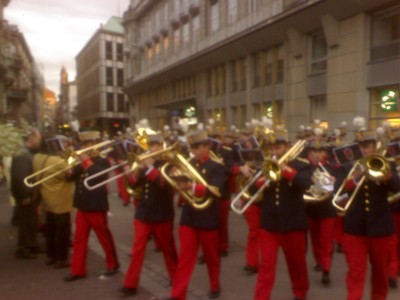
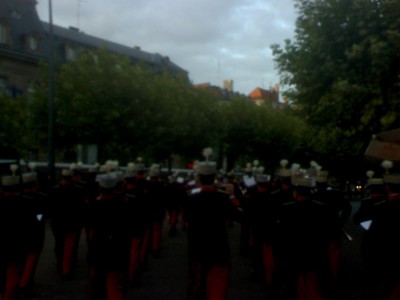
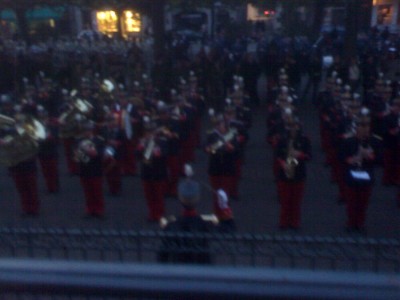
Since modern Defence must be able to use all Arms nowadays, EuroCorps tried to charm Strasbourg's People with Music accross popular streets...













